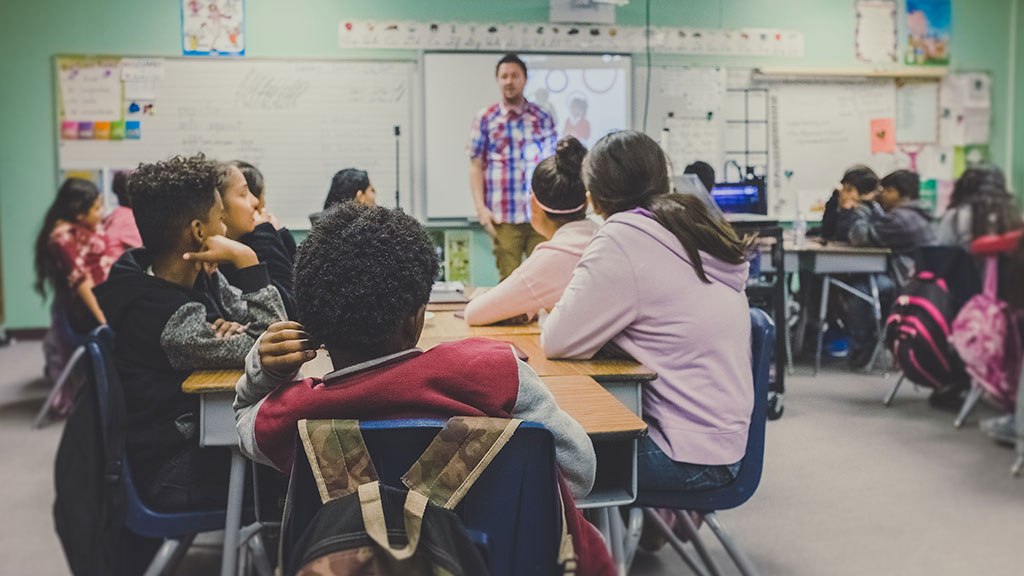Sixth-year primary school students learn to look critically at digital culture
UOC researchers carried out a series of fun workshops in Barcelona schools to get pupils thinking about fake news, influencers and cyberbullyingThe young students involved used mobile phones to create animated videos on the three core topics

Researchers at the Universitat Oberta de Catalunya (UOC) have carried out a project, titled Designing to take a critical look at digital culture, with the aim of encouraging children to think critically about issues in the world of digital culture. Led by the Mediaccions research group at the UOC's Faculty of Information and Communication Sciences and with support from Barcelona City Council, the project was able to spark conversation around fake news, influencers and cyberbullying at three schools in Barcelona: Ramon Llull, Farigola del Clot and Miralletes.
As part of the project, the researchers put on a series of fun workshops involving over a hundred pupils in their sixth year of primary school (11-12 years of age), which is when children begin to receive a mobile phone and are able to venture into the world of social media. The workshops were prepared following the design-thinking methodology, which employs teamwork dynamics and techniques. Mediaccions researcher Gemma San Cornelio said: "It's a method that gets everyone to commit to and engage in the process; it fosters co-creation, collaborative work and creativity."
The workshops were split into three parts: an initial project presentation, research and creative brainstorming, and prototype-building. To begin, the researchers presented the project and introduced the design challenge. They also showed three educational videos about the topics and the problems they pose: 1) Fake News: Think before Sharing!; 2) Influencers: Is Being an Influencer Worth It?; and 3) Cyberbullying: We Can Stop It!. This gave the pupils the chance to familiarize themselves with these core concepts.
In the next part of the workshops, students played a card game to delve deeper into the topics. The game was designed by the researchers, who drew inspiration from the focus-group research method. Their aim was to stimulate conversation among the schoolchildren, encouraging them to share their experiences as part of the game. There are two types of cards in the game: situation cards and situation response cards. On the latter, multiple response options are given, including a free response. There are three card decks, one for each topic. Based on one of the situations placed upwards on the board, the students were told to create a sentence with one of the concepts they had worked on in the game.
In the final, prototype-building part of the workshops, students were asked to transform the sentence they had come up with into emojis to then produce an animated video on their mobile phones. Each word was turned into an emoji and these were then used to make an animated film. The outcome of this process can be viewed on the project website.
According to San Cornelio, "the project made it possible [for students] to delve deeper into the critical dimension of technology at each stage [of the workshop], trying to assimilate the content in an exciting way through synthesis, creativity and prototype-building." She also added: "It was an opportunity to connect creative skills and, in some cases, technological skills that are very close to those used by many of the students in their daily lives."
The project ran from January to December 2022.
This research project is related to United Nations Sustainable Development Goal (SDG) 4, Quality Education.
Press contact
Anna Sánchez-Juárez
asanchez-juarez@uoc.edu
+34 620 041 736
UOC R&I
The UOC's research and innovation (R&I) is helping overcome pressing challenges faced by global societies in the 21st century by studying interactions between technology and human & social sciences with a specific focus on the network society, e-learning and e-health.
Over 500 researchers and more than 50 research groups work in the UOC's seven faculties, its eLearning Research programme and its two research centres: the Internet Interdisciplinary Institute (IN3) and the eHealth Center (eHC).
The university also develops online learning innovations at its eLearning Innovation Center (eLinC), as well as UOC community entrepreneurship and knowledge transfer via the Hubbik platform.
Open knowledge and the goals of the United Nations 2030 Agenda for Sustainable Development serve as strategic pillars for the UOC's teaching, research and innovation. More information: research.uoc.edu.
Experts UOC
Press contact
-
Editorial department
